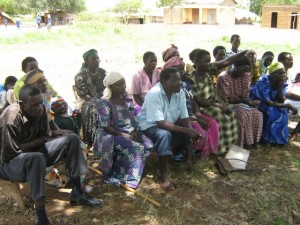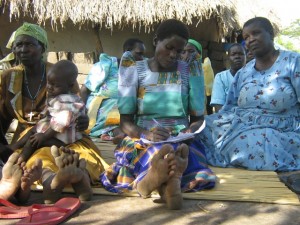Ugandans are preparing to go to polls to elect new leaders from local councils to the President. There is currently an ongoing campaign by the Civil Society Coalition for Electoral Democracy in Uganda to encourage voters to elect leaders based on issues and not on personalities or who gives them some inducement (soap, drinks, salt, sugar have been reported to be distributed by candidates seeking election). But what do ordinary Ugandans think about the people they elect and why do they elect the people they elect. We bring you this highlight from a research in Apac.
Like all districts in Uganda, Apac has an LC5 (district) government, with a Council and an Executive supposed to implement government programmes in the district. The district government is headed by an elected district chairperson. Every Sub-country elects a representative (councilor) to the district council, including a woman representative for each sub-county. All sub-counties also form the lower (LC3) government, with an elected chairperson as the leader.
There is a Sub-county council made up of representatives from every parish, including a representative for women for every parish. At every parish (where the lowest government planning unit-the Parish Development Committee is found), there is an elected committee from the LC1s of that parish. The LC1 is the lowest (village) governance unit, made up of a committee with a chairperson. At both LC1 and parish (LC2) at least three of the mandatory nine committee members must be women[1]. Each of the counties of Apac have an elected representative in the national parliament. The district also has a woman representative in parliament.
Limited participation in governance
With such an elaborate and gender inclusive governance political and representation structure, one would think that local (read rural women) people’s concerns and aspirations are part and parcel of policy making at every level of governance.
But this research has found that local people (especially rural women) have overwhelmingly lost interest and trust in their leaders at all levels. As if they had met and agreed on what to tell the research team, all people in every group said once they elect the leaders, the leaders turn their back on the electorate.
In group after group, respondents were very vigorous in condemning political leaders and representatives for not consulting the local people, and doing things that mostly benefit those in political leadership.
Lack of consultation by political leaders
The lack of consultation especially from MPs and Councilors was evidently disheartening to the women, many of them swaying their hands in apparent resignation, only swearing that let them wait for the next election to teach their elected leaders a lesson. In one group in Akokoro sub-county for example, the women said they had never seen or heard from their woman MP, Betty Amongi, serving her second term as woman MP for Apac. “Even if we met her, we cannot recognize that this is Betty Amongi. We only hear that she is a very beautiful woman,” one of the respondents said, causing laughter amid hands and head swaying of other members in agreement. In the neighhbouring group still in Akokoro, only two women said they had ever seen Amongi’s photos during campaigns. This prompted the question: why do you elect these same leaders again if they do not consult you or do good things for you?
Some said they are not the ones who elect such leaders, others said they were convinced to give ‘such leaders’[2] a last term to accomplish their programmes, while some said they were convinced that the same leaders would improve this time round. But further probing revealed two important issues. One was that many women rarely vote or attend rallies/ meetings, where political leaders consult local people or campaign. This is mainly because of their heavy workload and domestic chores. The second is that many people (as admitted by many group members) vote whoever gives them “something”. Though not referring to themselves particularly, many respondents said people vote whoever buys them a drink, or gives them some little money. The defense for this kind of attitude and behavior was that all the people they elect are the same- all good promises and no helpful action on the ground. Actually the term used in two groups to describe elections was “choosing who to go and eat this time”[3].
However local leaders, specifically two councilors interviewed said they consult people and lobby for projects, but much of the electorate is not aware of what goes. “For example you organize consultative meetings in the villages, people don’t come, especially the women. They always claim they are busy at home. This is when we also tell them about what is being done for their benefit. But how can you hear from your representatives when you don’t come for meetings. We (councilors) even decided to start consulting our people during PTA meetings at schools, but seome people especially women do come to the meetings,” said Wacco Dickens, the Apac district Speaker and councilor for Cheger Sub-country. This was the same feeling of other local leaders interviewed.
This does point to a strong communication/ information gap between the leaders/ representatives and the electorate in order to promote effective governance. But on the other hand it does point (as intimated by Wacco and Apir Fredrick Okulo, the Councilor of Ayer Sub-county) that the division of gender roles still places women far from governance issues/ duties. Wacco says women are always many in attending school visiting days, yet they say they lack time to come for PTA meetings at the same school. Okulo says this is because many women believe that meetings are a preserve of men, which calls for more sensitization for both men and women that all meetings and community affairs including political rallies should be attended and are a responsibility of both men and women.
Corruption a big concern for ordinary Ugandans
The respondents also expressed a lot of concern on corruption. Many interviewees expressed concern that because politicians are put at the forefront of development projects, mostly their relatives and friends benefit from such project. Here, the example of the Cattle re-stocking programme was mentioned with none of the women having received (in their home) a cow from the government cattle restocking programme.
There was also concern on injustices in the justice system as a result of corruption. It was found that the difficulties and costs involved in reporting a case to LCs or police up to it being heard even in courts of law makes many people forego seeking justice. Many stakeholder interviewees said police many times needs money from you before they can follow up your case, money that rural women do not have. In some cases, the accused bribe their way from police and the local courts. One of the interviewees claimed that files of 55 defilement cases were hidden and kept by the Resident State Attorney. It was only discovered recently when he was transferred. “When a prosecutor hides your file, the case basically stops,” says Tom Opwonya of the Apac Anti corruption coalition- AACC.
Ugandans experiencing Expensive justice
But it is not only is such scrupulous ways that rural people are finding elusive justice. This research found that the local council system, especially the LC1 (which is the most relevant governance organ for most rural people) presents its own challenges to rural people who want justice.
In all the villages (groups) where respondents were interviewed, there was overwhelming concern raised over the money required by the LC1 before they can hear your case. Since these LCs are allowed by law to make by-laws, this requirement to pay some money before your case is heard has been made officials in all areas where this research was carried out. “Even if they steal your only goat, and you happen to know the thief, the LC1 will not listen to your case until you pay five thousand shillings. Sometimes we are forced to sell our last seedlings, just to pay the LC to hear our cases,” said Margaret Eye, 50, one of the respondents.
Some women said they are forced to mortgage household utensils like saucepans and plates in order to get money to report people who might have cheated or stolen from them. This situation has made many people desist from seeking justice.
The LC1 officials talked to, one of them a woman justified the required to pay LCs money saying LC1 officials are not paid a salary and this money is required to pay allowances for LC officials when they meet to hear peoples’ cases. This was noted as a strong point because no busy person is going to leave their tasks to come and listen to your case or concerns without expecting a benefit.
It was strongly recommended by interviewees that government starts paying LC officials so that local people can start getting justice. The traditional role of cultural leaders in Apac who would have provided alternative justice was noted to be diminishing, while in some cases, it was noted that cultural leaders would most likely side with men if the case involved a woman complaining against a man.
Civic incompetence
This situation is being compounded by a high level of “civic incompetence,” as Tom Opwonya, the Coordinator of the Apac Anti Corruption Coalition put it. Many of the local people think leaders and those in authority are doing them a favour to the extent that few people can complain about bad treatment from public officials.
“Whether people are denied justice at the local police, sold medicine that is supposed to be free, they just take it like that,” Opwonya says. But the respondents attributed this to the general belief that public office is about “eating”. To many of them, when someone takes a bribe to foil your case or to hear your concern, or sells you drugs that should be free of charge, s/he is “just eating like all of them public officials do.” The civil society organizations like AACC that could normally help people in such a situation are not well known in all of Apac, leave alone the limitations of calling or coming to complain for many people in far off villages.
Because of the quagmire of lacking effective representation, limited or no consultation, corruption, denied and expensive justice, few people are ready to spend even a second of their time demanding for accountability from their leaders, representatives and public servants. “This calls for a lot sensitization to all people about their rights and responsibilities in ensuring good governance and public accountability”.
Training in leadership skills
Many of the respondents expressed need to be trained in leadership skills in order to improve the governance in their groups and to also be able to take on leadership positions. This was especially raised in support to women to get more skills in order to participate more in the public arena and influence community affairs.
This article is an excerpt from the good governance part of a Report on Information needs and information sources of rural women and women’s concerns in five areas of policy development namely Health, Education, Gender, Livelihoods and Good governance. The report was done by Gerald Businge and commissioned by Women of Uganda Network.
[1] It is a requirement by the constitution as one of the affirmative action policies to boost women’s representation in decision making organs.
[2] This reference was for leaders/ representatives who are seemingly unpopular, yet they are voted again.
[3] This was used to refer to the feeling that whoever they elect, caters for their stomach (own interests)


